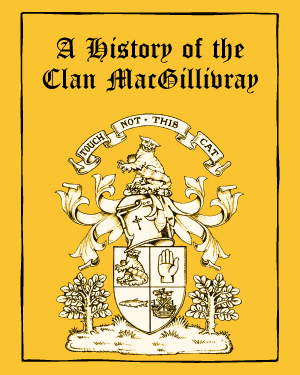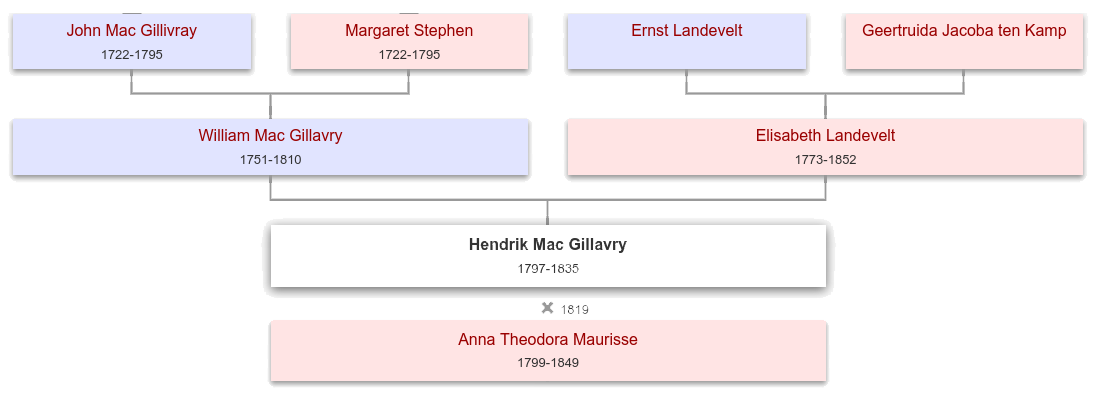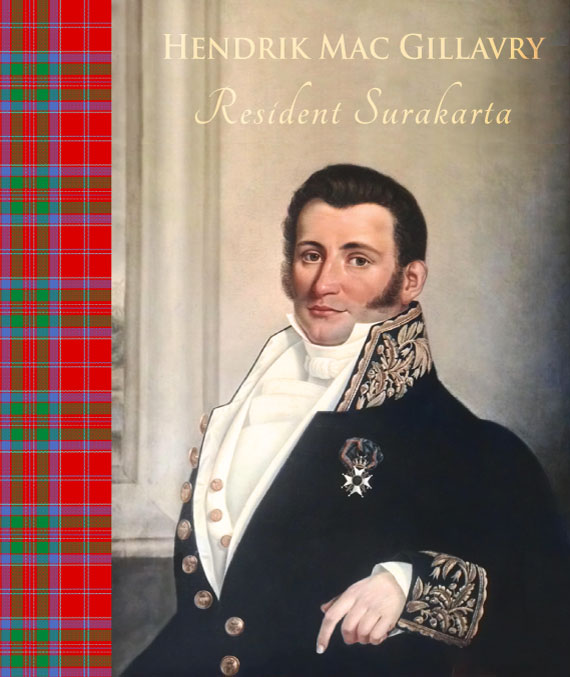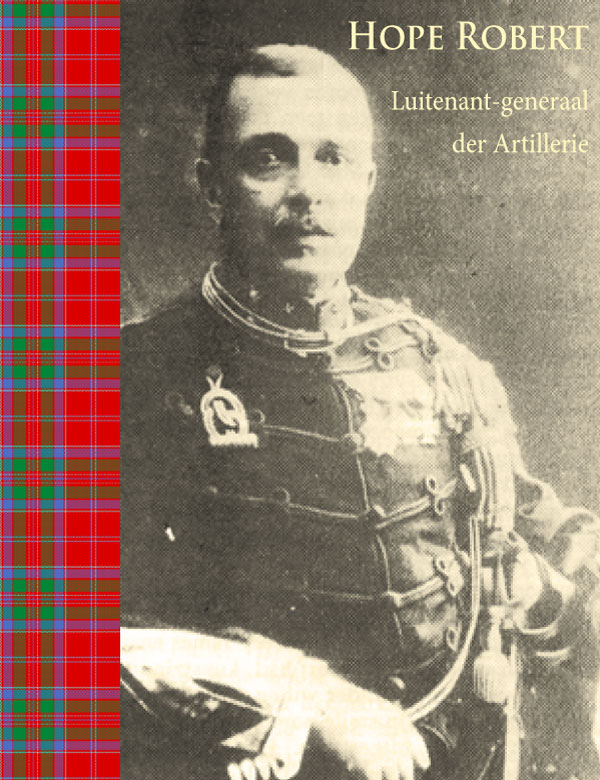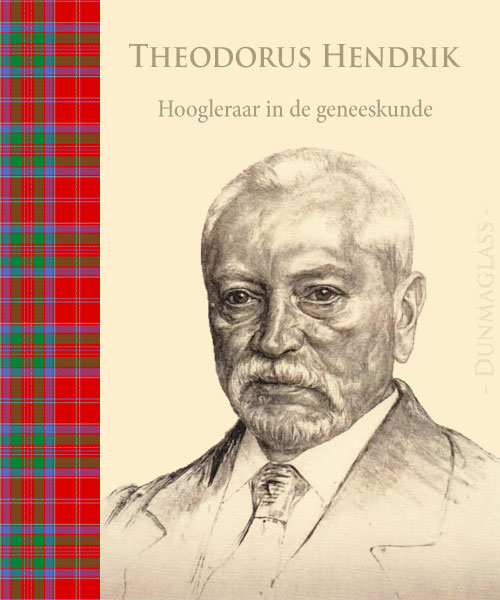Source: "A History of the Clan MacGillivray" (1973) by Robert McGillivray, George B. MacGillivray and Dr. E.J. MacGillavry
Of all the branches of the Clan none is more easily discernable or readily defined than that of the Dutch MacGillavrys, as they came to spell the name.
Here is a family with a romantic history which catches the imagination, gains the admiration of fellow Clansmen for its continuing achievements and arouses sympathy for those caught up in post-war colonial struggles.
If a precise date were to be placed on the foundation of this branch it might be 23rd March, 1781. That was the day on which William, a short stocky fellow, 5'5" tall, with fair reddish tinged hair and sharp blue eyes, enlisted in a Highland Regiment, commanded by Major General Dundas, destined for the Netherlands. William was the son of John MacGillivray, a drover in Elgin.
William took part in the Battle of Nijmegen, in 1794. The Highlanders, fighting with the allied troops against the French revolutionary army, behaved with great gallantry and suffered heavy losses. William, wounded, was taken to the town of Zwolle some hundred miles to the north. There he settled down as a teacher of English and, in 1795 at the age of 43 he married one of his pupils, Elisabeth Landevelt, a beautiful dark-haired girl from just over the German border and 22 years younger than himself. They had three daughters and two sons, Hendrik and William. The latter William had one son and one grandson, both officers in the Royal Dutch East Indian army. In the Second World War the only two great grandsons met their deaths under torture during the Japanese occupation. All living MacGillavrys are therefore descendants of Hendrik, soldier William’s eldest son.
Still in his twenties Hendrik was appointed Governor at the Court of the Sultan of Souracarta. Because of his diplomatic skill during the Java War the Dutch Colonial Government awarded him in 1830 the high honour of Knight of the Lion of the Netherlands.
Hendrik MacGillavry (* December 3, 1797 in Zwolle, Netherlands, + February 15, 1835 Soekaradja, Bogor, Java) and his wife Anna Theodora Maurisse (* August 30, 1799 in Leiden, Netherlands, + August 24, 1849 in Surakarta, Java).
Hendrik was a remarkably clever and ambitious young man. He headed for the Dutch East Indies, where by a suitable marriage and his own obvious abilities he was appointed, at the incredible age of 28, to the difficult post of Governor (Resident) at the Court of the Susuhanan (Sultan) of Souracarta. During the Java War he exhibited great powers of diplomacy which were later recognised by the Dutch Colonial Government awarding him the high honour of Knight of the Lion of the Netherlands. He died of cholera in 1835 at the age of 38. Had he survived his character and ability might well have taken him to the throne of the Vice-Roy of the Dutch East Indies. With his untimely death his family was left in a difficult position.
A 'Resident' was a Government function in the British and Dutch Colonies. A 'Resident' represented the Colonial authority. In the former Netherlands Dutch East Indies the 'Resident' was the governing head of a region overseeing a local Noble or Sovereign or 'Regent'. In British India a 'Resident' was a representative at the Court of a local Sovereign as well.
His wife with great self sacrifice and personal effort was able to send three of their four sons to University in Holland. The eldest son Willem (1820-1870) carried the early burdens of the family. But he held only a modest position in the civil service and when he died his family too was left in some difficulty. As a rule members found posts in the civil service and as surveyors on agricultural estates.
Hendrik's second son, Henri (1821-1889) was the founder of what is commonly known in the Dutch branch as the planters’ family because almost every male member possessed an estate, of some extent, where tropical products were cultivated; rubber, coffee, cacao, nutmeg, tobacco, sugar, vanilla, etc.
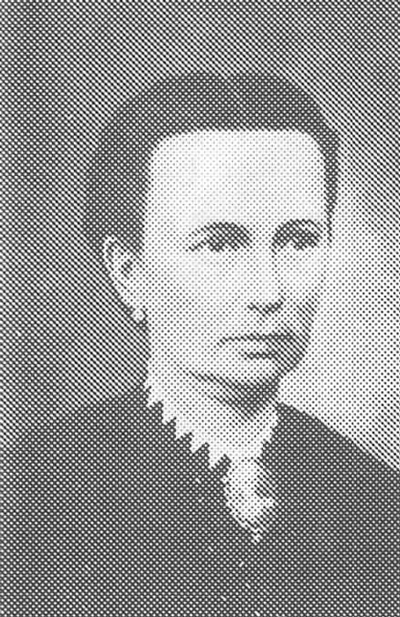
Louise Henriëtte Elisabeth Horst
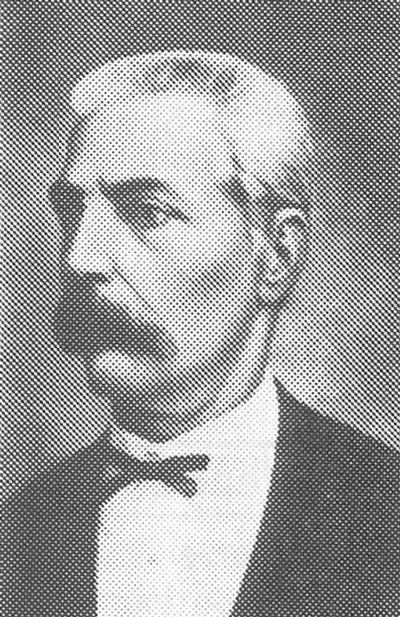
Henri Pierre Théodore Elise Mac Gillavry
Originally Henri studied theology at Leyden but he gave this up, returned to Java and married a wealthy heiress. His wife Louise's dowry consisted of the equivalent of some 10,000 pounds by 1848 standards and a prosperous sugar factory. It is said that at her wedding she even wore diamonds in her shoes. Henri was a very amiable, kind-hearted man, fond of the gracious things of life, but certainly, not a merchant or manager.
Unfitted for business he lost the sugar factory and his wife's money dwindled. Eventually he was forced to accept a position as a clerk with the General Trading Company of the Netherlands. When his company tried to get rid of their estates in the mountains he was able to acquire at a modest price the estate of Djati Roenggo, in the centre of Java some 20 miles south of Semarang. The estate was to become the centre of family activities for many years.
Henri’s eldest son, Henry Donald, was a most remarkable personality. Very small in stature he had a sharp strident voice, a difficult temper and an intellect verging on genius. In his hands Djati Roenggo was brought to prosperity. He lived accordingly, reigning like an enlightened potentate over not only his subjects living on his estate, but also over his family of which he considered himself to be the undisputed head. He demanded that they come at regular intervals and pay him homage. His guests were assured of a most hospitable welcome and abundant Easter style festivities. Those who were invited for the weekend often found themselves there two weeks later. Magistrates from the town were summoned imperiously to the estate to register there and then births or marriages of his numerous progeny. Arch conservative on one hand, he could be very progressive. At one time he cared for hundreds of refugees out of his own pocket following an eruption of the volcano Krakatoa. At the turn of the century the estate had electric light, the current generated from a fast flowing river, and this at a time when the cities of Europe were illuminated by gaslight! In his magnificent house the proud proprietor of all these marvels had a marble plate affixed to the wall of the corridor between the huge dining room and billiard room. On this plate were carved in golden letters the words of ‘Genesis’, “Lux fiat et lux erat” (Let there be light and there was light). Clearly this style of life could not last forever and returning from what proved to be his last trip to Holland he found the plantation ravaged by new and unknown diseases and the price of the products sunk to unheard of depths. In short he was a poor man. The second son, Edward, took over the management of the estate and by working almost day and night for a ridiculously low salary, to the detriment of his health, he was able to bring his father, just before his death in 1911, the cheering message that his beloved estate was clear of debt. Meanwhile a new and unexpected source of wealth was found. Henry was fortunate to have married a really remarkable woman, Anthonetta Suzanna Frederika Nagel. At her husband's request she had the servants roll his own cigarettes from tobacco on the estate. These proved popular with his friends and as more and more asked for them, more and more servants were employed to roll them. Eventually the care of this enterprise was entrusted to the third son, Anthony, a businessman to the tips of his fingers. He studied modern business techniques in the United States and applied them to his own affairs. A In 1934 the factory was sold to the British American Tobacco Company. Now cigarettes bearing the name H.D. MacGillavry, with the clan tartan proudly displayed on the packet, are produced and sold in South Africa.
To return to Hendrik’s family, the third son Robert was the founder of what might be termed the officer family. Robert himself held the honourable position of inspector of finance for the whole of the Netherlands Indies, the equivalent of a Minister of Finance.
Robert's only son with issue, Hope Robert, guided by his uncle became a Lieutenant General of artillery in the Royal Dutch East Indian Army and was awarded the rare military order of King William for bravery in combat during the Atjeh expedition.
His grandson, also named Hope Robert, was a Lieutenant Colonel in the Artillery of the Royal Dutch Army.
Theodorus, Hendrik's fourth and youngest son, was the founder of what might be termed the intellectual side of the family. Sent to Holland he worked his way through University, served as medical officer in the colonies for five years before returning to Holland when his health failed.
King William, III, with whom he had a personal friendship, granted him the personal title of Professor. In 1877 he became a pathologist at the University of Leyden. Earlier in 1875 he had been invited to become a member of the Royal Academy of Sciences in Amsterdam, a position reserved for the outstanding scientists of his country.
In 1884 in his medical capacity he signed the death certificate of Prince Alexander, the last surviving son of King William III.
Donald, second son of the Professor became a famous surgeon in Amsterdam. A man of noble character, beloved by patients and colleagues alike, Donald had six children three of whom are Professors at the present day: Donald, Professor of Chemistry at Clark University, Worcester (Mass.) had an important part in the development of atomic energy but resigned when he realised that the researches were leading to the atomic bomb; Carolina Henriette, Professor of Crystallography at the University of Amsterdam, the first woman to become a member of the Royal Academy of Sciences in Amsterdam; Henry James, Professor of Palaeontology at Amsterdam, who won a Shell world prize for the best geological research in 1966 which gave him the opportunity to continue his studies in Jamaica. Professor Theodorus’ youngest son Robert was head representative for Shell in the Dutch East Indies, a most responsible post at the time. Another daughter, Ellen, is a concert flautist with an international reputation who has given concerts in the U.S.A. and Israel. She also gave recitals in Scotland with her Scottish cousin’ James MacGillivray, an oboeist. Following her return from Scotland she made an arrangement of Scottish dance tunes which appeared on a gramophone record.
The Second World War brought unspeakable misery and incredible difficulties to members of this family. Many were executed or tortured to death by the Japanese because of illegal activities, or died in the many prison camps from exhaustion or starvation. Some of them behaved very bravely and were mentioned in military despatches. The end of hostilities did not bring an end to their problems. The conflict between Holland and Indonesia over New Guinea led to the expulsion of all Dutch nationals. They were forced to leave their possessions behind. This meant particularly for the members of the eldest family, farewell to a country where their family had lived for generations and had contributed so much to its prosperity. They now had to find a new living in a totally strange, cold, foggy country. Most have adapted remarkably well to their new way of life and have earned the admiration and pride of their kin in Holland. Perhaps because of their many vicissitudes, or isolation in a new environment, the Dutch branch, now numbering some 250 members (1973), exhibits a strong binding sense of clanship. Family ties have always been felt very strongly, deep friendships have developed and already there have been a few intermarriages. Each autumn an ever increasing gathering is held to preserve the ties of family and renew fellowship.
Notwithstanding differences in character, physiognomy, social background or intellect, the gathering is eagerly anticipated and held in a spirit of good will and affection which many a clan would envy and which the larger body of their own Clan might well seek to emulate.



